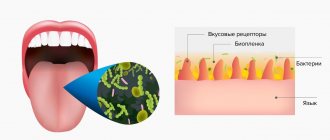January 19, 2019
Long gone are the days when the fair half of humanity used acetone-based products to remove nail polish. Today, cosmetic concentrates are no longer distinguished by such a pungent odor that literally clogs all taste buds. But what if the taste of acetone still appears in your mouth from time to time and has nothing to do with the use of paint or solvents? Read the article by the editors of the UltraSmile.ru portal: we will give some useful tips on how to act if a similar problem arises.
Why might there be a taste of acetone in my mouth?
Tip #1: Pay attention to what you eat.
If the taste of acetone appears in your mouth, then it most likely signals a problem in the body. But often pathology can be caused by your lifestyle and diet. For example, the taste of acetone in the mouth (as well as iron, for example) can arise for reasons that are quite harmless at first glance, both in men and women.
So, let's look at how dietary habits and unpleasant phenomena are related:
- you eat predominantly protein foods: often athletes, bodybuilders or those people who want to build muscle mass have a diet dominated by proteins, but they do not care at all about the presence of carbohydrate foods. However, it is carbohydrates that are also responsible for normal metabolism, and in their absence, the protein component does not decompose completely, which produces the production of substances called ketones or ketone bodies (essentially these are elements of acetone and acetoacetic acid). These substances are formed in the liver, then gradually spread through the bloodstream throughout the body and are excreted along with urine, and a person develops a disease such as ketonuria. The predominance of protein foods in the body can cause this effect
- you are on a strict unbalanced diet, you really want to lose weight and are starving: when the body does not receive nutrients, it begins to seek additional opportunities for its functioning. As a result, the breakdown of fats occurs, which the body draws from its internal “storehouses” - the fat layer and muscle tissue. And fatty acids again begin to enter the liver in increased quantities. The organ cannot withstand the load and releases acetyl. With this pathology, the taste and smell of acetone will appear in your throat and mouth. In addition, the urine will also have a strong smell of acetone,
- Do you overeat: do you prefer heavy and very fatty foods? This situation will again cause liver overload and acetone syndrome.
Important!
Many nutritionists today are against carbohydrate-free diets, because... they sometimes do more harm than good. Remember that any diet should be carried out based on the recommendations and consultations of a professional physician, as well as your state of health. And to avoid the consequences of strict diets or overeating, do not forget to drink large amounts of clean drinking water (approximately at least 2 liters per day) and healthy liquids (fruit drinks, herbal teas) - this will help remove fat breakdown products and avoid severe intoxication body, and, as a result, get rid of the taste of acetone in the mouth.
Prevention
- To prevent CG, high-carbohydrate (bread, cereals, rice, pasta, corn tortillas) and high-protein foods (red meat, chicken and turkey, fish, beans, eggs, nuts) are recommended. Do not allow your child to take long breaks from eating (maximum 6 hours); It is advisable that the child has at least 5 meals a day. A snack before bed is a must (milk, bun, cereal, bananas)!
- In case of an acute infectious disease, fever, nausea, vomiting, or loss of appetite, you should immediately begin giving the child sweet drinks (juices, lemonades, sweet tea, Coca-Cola). It is not necessary and useless to try to feed a child with CG only Borjomi/Narzan/Essentuki/saline solutions: they can prevent dehydration, but without sweet drinks it will not be possible to get the child out of CG, so saline solutions are only an additional measure to sweet drinks.
- If you are constantly vomiting and cannot replace fluid loss at home, you should immediately seek help from a doctor. Only if home drinking does not produce an effect, you should drip solutions intravenously - this method of treatment should not be used as a basic one.
What exactly CG is not:
- CH is not a disease, but only a violation of the tolerance to prolonged fasting
- CG is not a “neuroarthritic diathesis” (there is no such disease). CG is a real problem, “neuro-arthritic diathesis” is a mythical animal, therefore, these two things are not related. What does not exist should not be treated.
- CG does not lead to diabetes and is in no way associated with it.
- CH is not and never has been a “disorder of purine metabolism.” If someone claims the opposite, he does not understand either the metabolism of purines, or the metabolism of carbohydrates, or metabolism in general. CG is not a disorder of uric acid metabolism and is not associated with gout. A restrictive diet is not indicated, it is dangerous and harmful for CG, and people who recommend that children with CG avoid meat and carbohydrates have absolutely no understanding of this condition.
- “Gall bladder bend” is a variant of the normal structure of the gallbladder, and it is very common; this feature is in no way related to CG. By the way, if you have an excess of gallstones, you don’t need a diet either.
- KG is not a kidney disease.
- CG is not a liver disease.
So, the acetonemic state/ketotic hypoglycemia is not a disease, but a metabolic feature that requires the parent not to torment the child with diets and endless searches for the cause, but attention, so as not to miss and prevent the onset of a crisis. Timely drinking and a “sweet diet” will allow the child to safely outgrow this condition.
Tip #2: “Smell” yourself
We have already found out some of the reasons why the taste of acetone occurs in the mouth. But if a strong odor from the mouth is added to it (there will be a bad coating on the tongue), and the urine also smells of this substance, then you need to sound the alarm, because the whole set of alarming signs may indicate serious diseases of the body.
Bad breath may indicate a serious problem
If you suspect that you or your child have a pathology, be sure to check what the smell of morning urine is. The fact is that ketones produced by the liver tend to accumulate, so the morning smell after waking up or having recently slept will be especially sharp and characteristic.
What to do if your breath stinks?
The fight against bad breath should begin with a visit to the dentist, since most often halitosis is a consequence of poor oral hygiene and the resulting diseases of the gums and teeth. If the doctor does not find any problems, then the cause probably lies in gastrointestinal diseases, and you need to visit a gastroenterologist. Following these recommendations will help get rid of halitosis:
- Brush your teeth thoroughly at least twice a day (especially after meals), using a toothpaste containing fluoride, as it helps strengthen the enamel. Using a toothpaste or mouthwash with antibacterial ingredients kills bacteria in the mouth that causes bad odor;
- floss at least once a day to remove food particles stuck between your teeth;
- clean the surface of your tongue daily with a special scraper or toothbrush to remove plaque, which is a breeding ground for pathogenic bacteria;
- Clean your removable dentures regularly (at least once a day or as directed by your dentist);
- avoid dry mouth - drink more clean water, chew sugar-free gum to stimulate saliva production;
- Avoid consuming garlic, onions, hot spices, alcohol and coffee. Limit your sugar intake - it promotes the growth of microbes, which turn it into acid, which destroys tooth enamel;
- change your toothbrush every three months;
- Get a routine check-up with your dentist every six months.
Tip #3: Determine what other symptoms are present
In addition to the smell and taste of paint or acetone in the mouth, other signs may indicate diseases. We will look at several serious diseases that reveal themselves quite easily.
Diabetes mellitus: among other things, the patient may experience extreme thirst, dry mouth, and itchy gums. You will also be concerned about severe dryness of the skin and the resulting discomfort, frequent urge to urinate, poorly healing wounds, general weakness and dizziness. All this, along with the taste of acetone in the mouth, are the consequences of ketonemia and acidosis, which occur against the background of dysfunction of the pancreas and endocrine system of the body. Initially, it is because of problems with the pancreas that the body begins to produce several times less insulin, which provokes an increase in blood sugar levels.
Diabetes mellitus may cause acetone taste
If you suspect this disease, you should see an endocrinologist and take a blood test. If left untreated, the problem can even be fatal, as the patient may fall into a diabetic coma.
Esophageal diverticulum: the disease is associated with an abnormal structure or, as they say, “protrusion” of the wall of the esophagus. It occurs against the background of other problems in the body. For example, due to an ulcer of the duodenum or stomach, with damage to the lymph nodes, with tuberculosis. The pathology can also be congenital. In addition to the appearance of acetone taste in the mouth, it is also characterized by increased salivation, a feeling of a foreign body in the throat, and a dry cough (mainly at night). The smell of acetone appears because swallowed food literally lingers in the bulging area, accumulates there and begins to rot.
Neuro-arthritic anomaly of the constitution: this is a congenital pathology associated with metabolic disorders. Typically, this pathology is detected at a very early age or in adolescence in children. Moreover, for a long time, worried parents of children may mistake it for problems with the gastrointestinal tract. What signs, in addition to ketonemia (manifested by a strong smell of acetone from the mouth), are still present here: the child gains weight very poorly from birth, he is thin and very mobile, restless (signs of neurasthenia in this disease are diagnosed in 84% of all cases).
Attacks of the disease have short-term manifestations, most often it is causeless vomiting (today the child is nauseous and feels unwell, and tomorrow he is healthy and his well-being is not at all a cause for concern). The disease manifests itself especially acutely between the ages of 2 and 10 years. If you suspect it, you should see a pediatrician and endocrinologist.
Neuro-arthritic anomaly of the constitution manifests itself from early childhood
Glomerulonephritis: what is it? This is a kidney disease. And the signs accompanying the taste of acetone in the mouth will be the following: the appearance of edema, a sharp increase in blood pressure, pain in the lumbar regions.
If there is a taste of acetone in your mouth, then monitor your general condition: malaise, headache, fever, heaviness in the stomach, belching and heartburn, fatigue and insomnia - all this is a reason to visit a doctor as soon as possible. And the causes of such conditions can be different: weak immunity, stress and intense physical activity, kidney disease, bacterial infections, metabolic disorders, increased levels of thyroid hormones.
Infusion therapy
Indications for prescribing infusion therapy:
- Persistent repeated vomiting that does not stop after the use of prokinetics;
- The presence of hemodynamic and microcirculation disorders;
- Signs of impaired consciousness (stupor, coma);
- The presence of moderate (up to 10% of body weight) and severe (up to 15% of body weight) dehydration;
- The presence of decompensated metabolic ketoacidosis with an increased anion gap;
- The presence of anatomical and functional difficulties for oral rehydration (anomalies of the facial skeleton and oral cavity), neurological disorders (bulbar and pseudobulbar).
Before starting infusion therapy, it is necessary to ensure reliable venous access (preferably peripheral), determine hemodynamics, acid-base and water-electrolyte balance.
Tip #4: Get tested
The taste of acetone in the mouth almost always has not the most harmless causes, so this situation cannot be ignored. Try to contact your local physician as soon as possible, who will give you directions for blood tests (in particular, to check your condition and glucose levels), and urine tests (to detect ketone bodies). Ultrasound, instrumental research methods, and biochemistry may also be additionally recommended.
To identify the problem, it is necessary to undergo tests
For those who are in a hurry and want to test themselves before the doctors, you can resort to using special test strips for acetone. Buy them at any pharmacy and compare the results with the data presented in the product description.
“I developed an acetone taste in my mouth during pregnancy, and ketones were found in my urine. This happened in the first weeks, until about the twelfth. My doctor attributed it to the terrible toxicosis that I developed. Of course, she kept me under control, but I have to give her credit, although she didn’t scare me with all sorts of horrors, as they usually like to do. During this period, no food entered my mouth at all, everything asked to be returned, which means (as the doctor explained), that’s why these substances were produced, as if from starvation. Then I gradually began to eat and drink, and everything went away.”
Marina, review from the babyblog.ru forum
Metal structures in the mouth
After installing braces and crowns, dentists warn patients about the possible appearance of a metallic taste - this is a normal phenomenon that should subside within a week after the procedure. If this period has passed, and discomfort still makes itself felt, the reasons may be as follows:
- allergy to metal. It is very rare, but taking an allergy test will not be superfluous. If the suspicion is confirmed, the only solution will be a complete replacement of all installed structures;
- galvanism (interaction between metals), which occurs in the case of installation of orthopedic structures made of different materials that interact with each other. If all the crowns and posts are made of the same material and the amalgam fillings are replaced, the problem will disappear.
If you have metal dentures or implants, an iron taste may become noticeable after consuming acidic foods and drinks. Accordingly, the presence of piercings on the tongue or lips can also cause a similar effect.
Tip #5: Take Treatment Seriously
Naturally, treatment must be prescribed by a doctor. The set of therapeutic measures for each patient will be determined individually and according to the clinical situation, but first of all, the doctor will prescribe medications and liquids that will help stop intoxication of the body and remove harmful substances from it.
Then you will have to go for treatment and observation to a highly specialized specialist, for example, a gastroenterologist or endocrinologist. You will also additionally need to follow a plant-based diet, exclude fatty and heavy foods, and no fasting is allowed.
Notice
: Undefined variable: post_id in
/home/c/ch75405/public_html/wp-content/themes/UltraSmile/single-item.php
on line
45 Notice
: Undefined variable: full in
/home/c/ch75405/public_html/wp-content /themes/UltraSmile/single-item.php
on line
46
Rate this article:
( 8 ratings, average: 4.50 out of 5)
prevention
Comments
It is alarming when the taste of acetone in your mouth bothers you. You need to go get tested right away, because this clearly indicates that something is wrong in the body. Could they put you in the hospital because of this?
Sveta (01/30/2019 at 09:31) Reply to comment
- Sveta, they can if the situation is advanced. But the longer you wait, the greater the chance of ending up in the hospital.
Editorial staff of the portal UltraSmile.ru (01/31/2019 at 15:20) Reply to comment
I am a big fan of eating boiled food: eggs and chicken. Tell me, what standards should be observed for an adult? Then the taste of acetone in your mouth won’t bother you?
Vadim (01/30/2019 at 04:21 pm) Reply to comment
I noticed that my taste sensations had changed. And the taste of acetone in my mouth is very disturbing. What could be the matter other than what was described above in the article? I work as a manager at a grocery store, I cook lunch at home and take it with me.
Zarina (01/30/2019 at 04:43 pm) Reply to comment
- In the material we have identified the main problems that lead to this symptom. One of the main ones is diabetes mellitus. Please see a doctor as soon as possible and get tested.
Editorial staff of the portal UltraSmile.ru (01/31/2019 at 15:14) Reply to comment
Tell me, can the taste of acetone in the mouth and a pungent odor occur due to stress? I've been constantly worried lately, I work as an accountant, there are constant reports at work, the workload is very heavy. I don’t want to suspect a serious illness, and I don’t have time to get treatment right now.
Baklarova A.K. (01.02.2019 at 13:33) Reply to comment
- If the taste of acetone appears in your mouth, it may well be that it was caused by stress. Experts say that when we are very and constantly worried, our adrenal glands begin to work especially actively, which is why carbohydrate metabolism is disrupted. As a result, a bad characteristic odor appears from the mouth. But in any case, you should not let this situation take its course. Try to make time and visit a specialist, because in the case of advanced pathology, then it will be much more difficult to combine work with treatment.
Editorial staff of the portal UltraSmile.ru (02/03/2019 at 08:44) Reply to comment
I worry about the taste of acetone in my mouth when I start running in the spring. I usually run every other day, up to 8 kilometers, for 40-60 minutes. At the same time, I eat the same. Is it possible that the liver produces acetone due to running?
Inna (02/03/2019 at 23:15) Reply to comment
I'm worried about the taste of acetone in my mouth right when I'm leaving work. Could this simply depend on bad ecology or bad air from exhaust gases? Because at home I don’t notice this anymore.
Sveta (02/04/2019 at 18:17) Reply to comment
I work as a manager in a store. For a strange reason, the taste of acetone in my mouth bothers me... this has never happened before. Tell me, does poor nutrition affect this, or let’s say you have a cold, did you catch a cold last month?
Lisa (02/04/2019 at 21:53) Reply to comment
Recently I started working out at the gym and developed a taste of acetone in my mouth and a headache. Please tell me, can this condition be caused by sports and what to do in this case?
Olga (02/05/2019 at 00:02) Reply to comment
Is it possible to somehow prevent such conditions so that the taste of acetone does not appear in the mouth? What to do and will it help?
Ххх92 (02/11/2019 at 18:02) Reply to comment
- In fact, the rules here are quite simple, but we are only talking about situations that are not caused by serious diseases of the body. To minimize the risk of the taste and smell of acetone coming from your breath, try to drink enough clean drinking water every day (not juice, tea or coffee - they don’t count), don’t exhaust your body with strict diets and fasting (if you adhere to certain restrictions, don’t forget to include fiber in your diet, eat greens - onions, dill, parsley). Well, and, of course, maintain your immunity.
Editorial staff of the portal UltraSmile.ru (02/13/2019 at 08:38) Reply to comment
I always like to eat delicious food; in the morning I get a taste of acetone in my mouth. Can food cause such an unpleasant sensation? And tell me, is there any way to avoid this? This feeling has been troubling me for six months now.
Irina (02/12/2019 at 12:27 pm) Reply to comment
Could the taste of acetone in the mouth be simply due to the poor environment in the city? I come to my parents on weekends, nothing like this happens to me, but as in the city, this taste haunts me even at night.
Lera (02/12/2019 at 01:32 pm) Reply to comment
I'm worried about the taste of acetone in my mouth after I take a complex of vitamins that the doctor prescribed to me. Do you think they could be the reason? After half an hour everything goes away.
Irina (02/12/2019 at 01:43 pm) Reply to comment
Surprisingly: today I was thinking about whether there are toothbrushes made from natural materials, and I came across the article “advantages of bamboo toothbrushes.” It's good news that such things exist. But I remember in Soviet times there were toothbrushes made of natural bristles, do such things exist now? If so, then maybe they are better for teeth than synthetic ones?
Elena B. (02.26.2019 at 14:38) Reply to comment
Interesting advantages of a bamboo toothbrush, I was especially interested in its environmental friendliness and aesthetic appearance. Can I use tooth powder when brushing my teeth with a bamboo brush?
Ekaterina (02/26/2019 at 06:37 pm) Reply to comment
Our whole family uses these carbon-coated brushes, my husband and I have medium hardness, and the baby has soft bristles, it cleans very gently) we want to try with tourmuline, can a child use a brush with tourmaline coating?
Maria (02/26/2019 at 10:02 pm) Reply to comment
I’ve been looking at this for a long time, I didn’t know that there were big advantages to a bamboo brush. Is it worth ordering similar ones made in China? with Aliexpress, for example? Or should you not spend money on these and immediately buy a proven one?
Elena (02/27/2019 at 04:27 pm) Reply to comment
I didn’t think that the reasons for the taste of iodine in the mouth could be so varied. It is probably difficult to get an overabundance of fashion while being far from the sea. Although if you consume isolated foods, this microelement can accumulate in the body.
Tatyana (02/28/2019 at 14:31) Reply to comment
In my case, this is a manifestation of the first reason for the appearance of the taste of iodine in the mouth. I love seafood, I didn’t think there was so much iodine in them, and I also take the microelement separately in the form of a dietary supplement. You'll have to give up something. How long will it take to normalize the concentration of iodine in the body if, apart from the smell in the mouth, there are no other manifestations of excess?
Margo (03/02/2019 at 14:16) Reply to comment
The reasons for the appearance of iodine taste in the mouth are different; if it appears, it can be a serious health problem. Are there statistics on what percentage is the cause of excess iodine in the body? After all, there are many people who regularly eat a lot of seafood, but they do not complain about the taste of iodine in their mouths.
Anton (03/02/2019 at 15:30) Reply to comment











